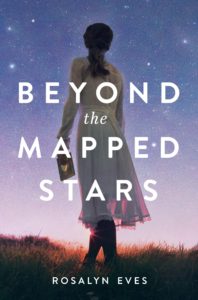 Title: Beyond the Mapped Stars
Title: Beyond the Mapped Stars
Author: Rosalyn Eves
Publisher: Knopf
Genre: Young Adult Historical Novel
Year Published: 2021
Number of Pages: 368
Reviewed by Rachel Helps
My friends have been raving about this book–a historical YA novel with a teenage protagonist who wants to become an astronomer, set in 1878 Utah. People are excited that this book with strong religious elements had a mainstream publisher.
I have done a bit of background research into this time period, both for work and for my own interests. Historically, I love how Eves used real people and events as part of her narrative. I especially liked the inclusion of the Women’s Exponent. Elizabeth’s family situation, taken from one of Eves’s own ancestors, is also true to the time period.
Some things I weren’t sure made sense for that era. Elizabeth feels a strong pressure to be a woman homesteader and mother, and feels that studying astronomy would be selfish. Was there really a cultural pressure for this? I don’t know, I’m just questioning that. I think the panic about women working “outside the home” didn’t start until the 1950s. In the pioneer era, of course women had to work. Everyone did. There is certainly a difference between domestic labor and more scholarly work though.
There were a lot of exciting things that happened, one after the other, and I can see this as a narrative device to keep things interesting. I would have been find with a more leisurely pace for “events” (but I’m also not a typical YA reader). Elizabeth meets a ton of people and I couldn’t really keep track of all the scientists.
Eves has Elizabeth praying to Heavenly Mother. I’m very curious if this is something she slipped in to convey her own feelings about Heavenly Mother, or if she found historical evidence for the practice (I believe it is anachronous). Elizabeth also ponders social justice issues like her friend’s intersection of wealth and race and the advantages and disadvantages this gives her. Again, I agree that this is an interesting topic, but I don’t think it’s historically accurate. Eves actually addresses this argument in her author’s note (which was a really excellent historical summary of some of the issues in the book):
Some may argue that this book is not accurate because Elizabeth and her friends adopt more progressive attitudes in the West toward race than were likely for the era. To this I would say, first, attitudes in the West toward race were as varied as the individuals living there. Second, this is a work of fiction, not a historical study, and some liberties are allowed for the sake of the story. Historical fiction is always a balancing act between the mores of the past and present values.
It’s making me think about my assumptions about historical fiction. I think it’s hard to pin down how someone would have thought then and convey it to a modern reader. Certainly it’s easier, and probably more attractive to an editor, to have characters think in a modern way about race, gender, and religion. [spoiler] And I think because of that, I was able to really relate to Elizabeth in the final pages, when she somewhat predictably chooses [to get married and to go to school. [end spoiler] The line that really struck me was after she contemplates the “and” she can have in her life: “And now I do begin to cry, because I have been afraid, because I have been small, because I thought myself trapped by the expectations of others when it has really been my own fears that trapped me.” There’s a tarot card that I’ve been thinking a lot about ever since the pandemic began: the 8 of Swords. One of my decks describes it as “trapped, but not really.” It shows a person, loosely bound and blindfolded, surrounded by swords. It looks like the person could remove their own blindfold and bonds and simply leave. I have been trapped, like Elizabeth, in my own expectations for what my life should be like, even if those expectations don’t match up to my aspirations. To realize that my main obstacle is myself is difficult. To watch Elizabeth go through that helped me to see her in myself and to understand the constellation of beliefs and expectations that lead there.
